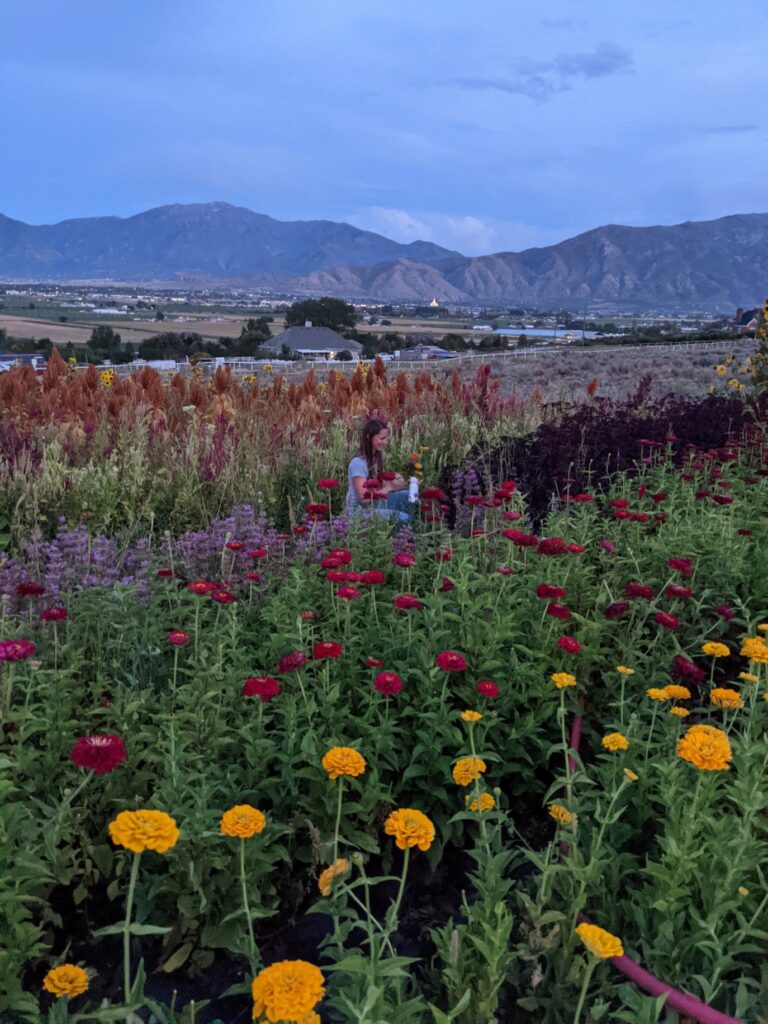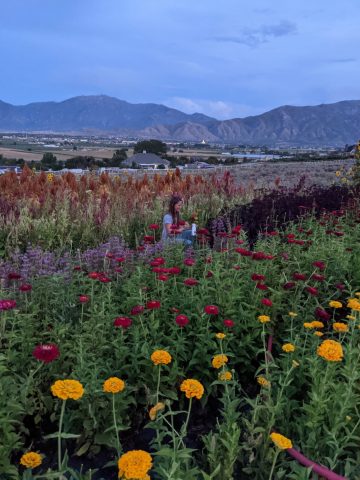Guest Post by Tasha. Bio: Tasha mothers four children and chooses the beauty of a mixed-faith marriage. She works in a library, craves plants, and runs in the dark of the morning.
Why do I stay? Why do I continue to attend Sunday service, weekly activities, and serve in callings in the Church of Jesus Christ of Latter-Day Saints? The answer is decades-long, decades of redefining, discoveries, and experiences. And even now my faith is evolving and moving. But I will try to capture it into words for a moment.
For me, one of the most helpful discoveries concerning faith is the book Stages of Faith by James Fowler. He defines faith as a human phenomenon, a search for meaning. The book also breaks faith development into six stages that correlate with human development. According to Fowler, stage three is a vital and important stage in the process of development: just like being a child, stage three is dichotomous thinking.
For some reason, many adults in this religion never progress past Fowler’s stage three ideas. I think it is because Mormonism is a fundamental religion that caters to and promotes dichotomous thinking; a lot of the curriculum, scripture, leaders, and decisions use fear as a motivator and read scripture literally. This is frustrating; however, I have witnessed people’s movement from stage to stage and find that the process is fluid and beautiful. Religion is not for everyone, but I like it. I stay because I have encountered the divine here; not just through finding deep and profound meaning but also through unlearning, tearing down, and creating space for my ideas.
Like all history, the history of the LDS church is messy and full of human behavior. Racism, sexism, elitism, and selfism have caused incredible suffering in this church. It has hurt me and the people I love deeply. I have had to untangle myself from the cruelty, hate, fear, and division promoted through the pulpits of this church; however, this is not the church I stay in.
I read Sister Saints, a book about Mormon women since the end of polygamy, and in it, Sonia Johnson, a spokeswoman for Mormon feminism, who “when asked why she belonged to a church whose rules she did not want to obey, she raised a larger issue of who constituted the church. ‘Well, I think they think it is their church,’ she observed. ‘But I felt as if it was my church too, you know.'” Johnson recognizes this assumption that men in history and men today are capable and able to tell others what God thinks, that certain men stand between The Divine and a human; however, this is not the case. Like Johnson, I define faith and God and goodness for myself.
The Mormon church is not just the chaotic oppositional Presbyterian church it started out as, nor the politically deviant and violently persecuted church of polygamy, nor the anti-democrat and anti-feminist regime, nor the anti-gay and anti-historically accurate policies and ideas propagated by a few members who write history: it is me. This church is filled with people who choose to love and serve and listen and learn. People who have differing experiences and disparate backgrounds, people from all around the world who create their church with love, listening, and curiosity. A place where people heal. I stay because it is “my church too, you know.”
In Fast Girls, a novel about the 1936 women’s Olympic team, there is a story about a man who served in the military with his friends in WWI. None of his friends made it back alive. Years later, this man got all dressed up in his uniform and excitedly took his niece to a Fourth of July celebration in the town where a plaque was uncovered honoring the fallen men who died for their country. As the names were read, the uncle wilted realizing that his comrades’ and dear friends’ names were not on this plaque: they were African Americans and the government did not see it “fit” to honor them in this way. The injustice is sickening, the dehumanization appalling. Interestingly, in this story, that same African American veteran wears his uniform to the parade every year and waves the American flag from his porch – not to support the plaque or racism – to celebrate his country and his friends who died for that country. There are two countries simultaneously existing side by side in the same town. Both are real.
In a less dramatic and less horrible way, I see my story in the veteran’s story. I see me dressing up twice a year in hopes that my letters to the general offices and my prayers to God were heeded and then wilting as I witness another conference where women are grossly underrepresented; I see my little young self diligently reading The Book of Mormon every night without a single heroine and so few feminine pronouns that unknowingly I erased my own; I see my body sobbing on so many floors begging God to love me, to speak to me, to save me from myself in a language and rituals designed by the men who never thought of me in the first place; I see generations of women and minorities not described as He or His wilting under the words, practices, and prophets that forget them, exclude them, and condemn them. The dehumanization and ingratitude are crushing and I carry the wounds of my mother and grandmothers. This church is real.
This church historically and currently excludes women from authority, leadership, speaking, decisions, design, finances, and creation. Additionally, this church excludes LGBTQ people from marriage and acceptance; the wounds fester for generations. Curiously, this church only excludes and oppresses everyone the leadership is not (female, colored, and queer) while honoring and celebrating everything the leadership is and understands.
We are all limited by our experiences and the doctrine of this church is clearly limited by its white, straight, male experience. This church is real, it exists. However, simultaneously, another church exists with the same name. A church where women do not wait for permission, where no one defines God for another person or discredits another’s experience; where everyone belongs, especially the marginalized, the queer, the feminist, the questioning, and the confused. A church where there are no limits to faith, God, and Self. Where the divine is found within. Where rituals are fluid and changing with the personal experiences of the people. This church is real, too. I know. I made it.
Staying in this church is lonely. However, I appreciate people who leave – people who turn away from a history that hurts, and a current culture that promotes it. Their leaving helps the church learn, helps it change so all of the babies that are born into it now are raised with more information, more power, more courage. And then I stay because the church I see is beautiful. I feel like the veteran who dresses in his uniform on the Fourth of July. The uniform represents racism and a history of horrors but it also represents something else. Something deep inside him that not everyone sees or understands. His country is just as real as theirs. And even if he can’t bear to wear the uniform anymore, his beautiful country still exists and he can take it wherever he goes.







11 Responses
For whatever reason, and I don’t know what it is, I’m no longer allowed to teach or speak in church. BUT if I ever am allowed to sometime in the future, I will be using this story of the veteran. I am a military veteran and a church veteran and I relate to the two-countries, two-churches. Sometimes I see hope and love, sometimes I see disinterest and dismissiveness. This is the best post I’ve ever read in the Exponent II. Thank you, Beth
Every tithing dollar paid to the Church is a vote for the status quo. Every time you are included in the ward clerk’s attendance ledger, you are telling the Church to stay on its course.
Don’t get me wrong, there are lots of great reasons for non-believers or questioning believers to stay in the Church, but it will never change if people stay in the pews. There is literally no mechanism for advocating for change within the organization. The system is designed to shield the leadership from criticism. Telling your bishop how concerned you are about misogyny, church history, doctrinal issues, etc. is like bitching to the cashier at Walmart about the price of a bottle of pickles. It may make you feel better, but it is meaningless if you keep buying the pickles.
There is nothing wrong with staying in the Church as a non-believer, but don’t delude yourself into thinking you are advocating for change. If every frustrated Mormon in the Church left tomorrow, the Church would change. You are staying in the church for interpersonal reasons. Again, there is nothing wrong with that, but you will never foment change while sitting in the pews. The author of this post is doing as much to prop up the Church’s questionable teachings as the true-believing misogynist sitting behind her in sacrament meeting. In fact, she is probably doing more to support the questionable teachings because she is normalizing the idea of creatively (and internally) reframing the Church’s teachings to fit her worldview. The Church doesn’t really care what you believe so long as you show up on Sunday, pay your tithing, and keep your divergent views to yourself. The author of this post is doing a great job of that.
It is good that you have identified the harm that the Church has done, and is continuing to do. But without helping to change it, what is the point?
This is something I’m wrestling with. I don’t pay tithing but I do attend (to a degree) and hold a calling because some of my immediate family attends and I wonder if progressive Mormons are actually the number one legitimizers of a fundamentally discriminatory institution -making LGBTQ friendly folks and feminists and other “liberals” feel more comfortable with a Church they shouldn’t really feel at all comfortable with.
I do love the concept of two churches and we are all the body of Christ, sure, but there is only one “Church” and it’s the one that RMN runs.
Funny to quote Sonia Johnson.
The author is not keeping her divergent views to herself. She wrote this post. She says she’s been writing letters to church leaders. To me, that sounds like she’s trying to help change it.
Thank you for sharing your feelings in this post. I can relate to many of them.
Onondagus wrote, ” If every frustrated Mormon in the Church left tomorrow, the Church would change.” I don’t agree with this at all. In fact, the belief that “many are called, but few are chosen” would keep them from changing. There are enough people who are doctrinally okay with the church remaining “pure” and small and are waiting for a culling of the church as a demonstration that the Millennium is coming soon.
I really appreciated the author’s openness and her journey. Thank you for taking the time to share your journey with us.
Maybe, but I think it would be awfully, awfully small. Sure, they could sit around and be smug about “the great sifting” that they ended up on the right side of but their influence would be significantly diminished.
And I’m not convinced they wouldn’t change. Women who keep listening to conferences at which we don’t speak, keep doing callings where we aren’t actually in charge, and keep taking our children when they will ultimately be rejected are honestly a big part of the problem. Sorry if that’s victim blaming – of COURSE I blame RMN and DHO more than anyone else – but I also wish women would WAKE UP and stop celebrating their own marginalization and gaslighting themselves. We get enough of that from the pulpit.
THIS is the BEST explanation that a thinking woman has given for staying in the church. I respect her decision and I applaud her resolve. In fact, just a tiny bit do I wonder whether all those long years ago when I felt inclined to (unofficially) leave, would I now be as strong as the author in supporting something with so much negativity to what I need and feel about a religion. I think not, because there are other aspects that are lacking for me, but I really think the author is earnest and with that being, I hope she is a force of change. I do see, though, as one has commented, still attending does give the church the smoke screen that all is still well. I, for one, have found all of the goodness of religion in the Episcopal church, and besides, I love the music.
I am a thinking woman, and I stay right now because my daughter goes to YW and my son goes to primary because they both want to and I don’t think it’s right to forbid them and I’m not going to have them (especially her) go alone (esp when I can be in YW with her and teach a lot of the lessons). I guess I am a little confused by what you mean by “a thinking woman” or how someone’s reasons could be better than another’s. But I may be misinterpreting your comment.
“however, I appreciate people who leave – people who turn away from a history that hurts, and a current culture that promotes it. Their leaving helps the church learn, helps it change so all of the babies that are born into it now are raised with more information, more power, more courage.”
ouch. well, happy to have helped.
in a similar fashion, i appreciate those who have stayed — people who turn toward a history that hurts, and a current lds culture that promotes their sacrifice as acceptable.
Their staying helps those who have left continue to see the damage that can be done when good meaning people tolerate a culture that protects a history that hurts.
it helps their parents continue on their path, so that eventually all of the babies that are born out of the church don’t know anything about it, and are raised with information, power, and courage, and with no first hand knowledge of the conflict and pain associated with the lds church.
Oh, Tasha, I love you. I learn so much from you and your ability to see beauty and goodness and love. You embody those things. Thank you for writing and sharing this.